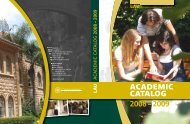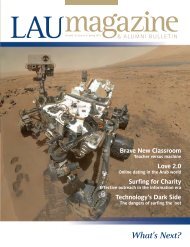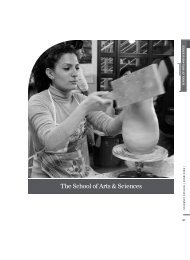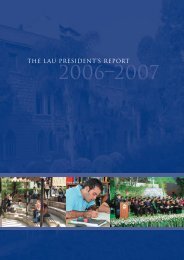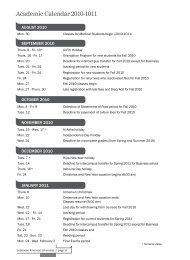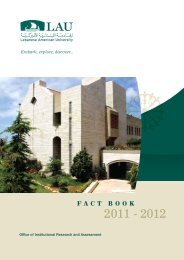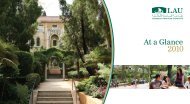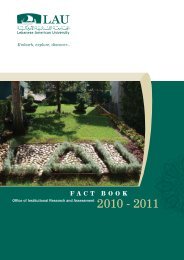academic-catalog2011.. - LAU Publications - Lebanese American ...
academic-catalog2011.. - LAU Publications - Lebanese American ...
academic-catalog2011.. - LAU Publications - Lebanese American ...
Create successful ePaper yourself
Turn your PDF publications into a flip-book with our unique Google optimized e-Paper software.
Department of Natural Sciences<br />
BIO201 General Biology I [3-3, 4 cr.]<br />
This course is an introductory, yet<br />
comprehensive, study of the chemical,<br />
cellular, and the tissue organization of life, the<br />
transfer of energy through living systems, the<br />
expression of genetic information, essential<br />
microbiology principles, as well as a discussion<br />
of the major characteristics of viruses,<br />
bacteria, fungi, protists, and plants.<br />
BIO202 General Biology II [3-3, 4 cr.]<br />
This course is an introduction to the<br />
classification of the Animal Kingdom, and an<br />
in depth discussion of animals and plants,<br />
with particular emphasis on the study, and a<br />
comparison, of structures and functions, and<br />
of tissues and the organ system, all within<br />
the context of diversity of life as shaped by<br />
evolution.<br />
Prerequisite: BIO201 General Biology I.<br />
BIO203 Introduction to Ecology [3-0, 3 cr.]<br />
This course introduces the organization<br />
of individual organisms into populations,<br />
communities, and ecosystems. It focuses on<br />
the interactions between living organisms and<br />
their physical environment. Concepts such<br />
as diversity, competition, natural selection,<br />
adaptation, climate changes, migration,<br />
extinction and deforestation are covered.<br />
Additionally the course tackles concepts of<br />
environmental microbiology in relation to<br />
pollution, remediation and recycling of liquid<br />
and solid wastes.<br />
BIO311 Microbiology [3-0, 3 cr.]<br />
This is a course intended for the Biology Major,<br />
and covers principles of microbiology, and the<br />
impact these organisms have on man and<br />
the environment. Topics include the history of<br />
microbiology, a survey of the different types<br />
of microorganisms, prokaryotic cell structure<br />
and function, microbial nutrition and growth,<br />
control of microorganisms and microbial<br />
metabolism, physiology, genetics, interaction<br />
of microorganisms with other forms of life, role<br />
of microorganisms in disease, immunity, and<br />
other selected applied areas.<br />
Prerequisite: BIO201 General Biology I.<br />
BIO312 Microbiology Lab [0-3, 1 cr.]<br />
This course explores the ubiquitous nature<br />
of microbes. The overall objective is to<br />
implement exercises which allow students to<br />
obtain a hands-on experience in many of the<br />
microbiological techniques routinely employed,<br />
with emphasis on the methodological, and<br />
clinical, relevance of the procedures. Students<br />
connect theoretical lectures to the practical<br />
applications in medicine, environment, and<br />
other related fields.<br />
Prerequisite: BIO311 General Biology I.<br />
Pre-or Co-requisite: BIO 311<br />
BIO321 Genetics [3-0, 3 cr.]<br />
This course is a study of the factors governing<br />
heredity, and variation, in plants and animals,<br />
on the classical and modern levels, with<br />
an emphasis on molecular and microbial<br />
genetics, and an introduction to recombinant<br />
DNA technology.<br />
Prerequisites: BIO201 General Biology I.<br />
BIO322 Genetics Lab [0-3, 1 cr.]<br />
This course familiarizes students with topics<br />
ranging from DNA structure and organization,<br />
to cellular division, through meiosis and<br />
mitosis, and karyotype analysis. Students will<br />
acquire a hands-on laboratory experience<br />
in Mendelian genetics, by performing<br />
experiments with Drosophila melanogaster<br />
and Zea mays. It also includes problem solving<br />
sessions in Mendelian and non-Mendelian<br />
population, and in bacterial and yeast genetics<br />
that will help the students to understand the<br />
theoretical portion of the course.<br />
Pre or Co-requisite: BIO321 Genetics.<br />
BIO331 Ecology [3-3, 4 cr.]<br />
This course covers the study of the relationships<br />
between living organisms and their environment.<br />
Major concepts related to the structure,<br />
function, organization, and regulation, at various<br />
levels (population community, ecosystems, and<br />
biomes), are covered via theory, laboratory<br />
work, and field trips.<br />
Prerequisites: BIO201 General Biology I, and<br />
BIO202 General Biology II.<br />
BIO341 Plant Physiology [3-0, 3 cr.]<br />
This course covers the study of fundamental<br />
processes underlying survival, growth<br />
development, and normal functions of plants,<br />
with special emphasis on photosynthesis,<br />
respiration, mineral nutrition, water absorption<br />
and transpiration, translocation of solutes,<br />
hormonal control, and development.<br />
Prerequisites: BIO202 General Biology II, and<br />
CHM312 Organic Chemistry II.<br />
ACADEMIC CATALOG [ 2011-2012 ] SCHOOL OF ARTS AND SCIENCES<br />
177



